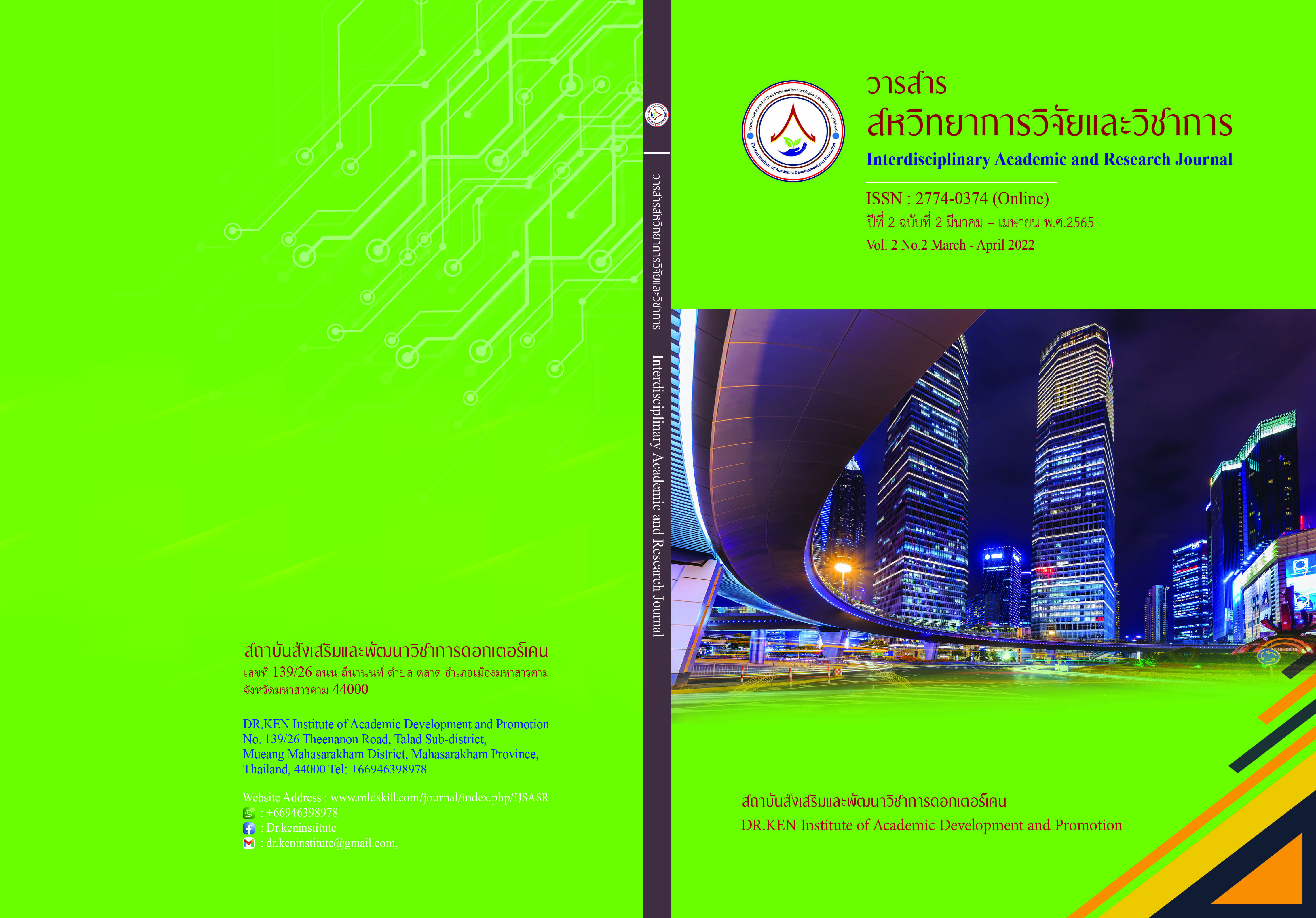Government Based on Buddhism Principle
DOI:
https://doi.org/10.14456/iarj.2022.10Keywords:
Government,, Dhamma, , BuddhismAbstract
Human society has many interrelated characteristics such as religion, education, job duties, social status, domicile. In a society, there will be a government in every society so that humans can coexist peacefully, there must be rules and regulations to govern until the development of various regimes such as democratic governance. with the King as head of state. As for Buddhism as the main institution that centers the mind of Thai society and contains the teachings of Lord Buddha, people in society are influenced by the concept of administration and governance from the teachings of Buddhism. Especially the dharma principles are taken from the scriptures of the Tripitaka such as the dharma, good governance for leaders or rulers. That is to say, the principles of administration and governance of the body and mind of a ruler with virtue in governing his subordinates. The main principles of ruling Buddhism are (1) Brahma Viharn dharma: Virtues that make one who practices it is noble, the word "Brahma Vihara" means the Dharma that is the dwelling place of Brahma. Adhering to such principles will enable one to live happily with others. (2) Todsapitrachadharma 10: the ethics that the King performs as his own dharma. (3) Sappurisaddharma 7: Dharma of a good person, Dharma that makes a good person, qualities of a good person, Dharma of a good person, or a genuine person who has the qualities of a perfect person. (4) Aparharanidhamma 7: Dharma is not a place of deterioration and justice that does not deteriorate, leads to personal and collective prosperity, brings happiness and prosperity to the group, is a principle that emphasizes Responsibility for the community leads to the unity of the group.
References
จรวยพร ธรณินทร์. (2552). 12 ไม้เด็ดสูตรสำเร็จข้าราชการ. กรุงเทพฯ : นานมีบุ๊คส์.
จักรี ศรีจารุเมธีญาณ. (2563). ความรู้เบื้องต้นทางรัฐประศาสนศาสตร์. ขอนแก่น : โรงพิมพ์คลังนานาวิทยา.
ประยงค์ แสนบุราณ. (2557). หลักธรรมในการปกครองของพระพุทธศาสนา. วารสารมนุษยศาสตร์สังคมศาสตร์, 31 (3),140-142.
พระชัฏฐวีร์ อนาลโย. (2564). หลักการปกครองตามแนวพุทธศาสตร์. วารสารพุทธนวัตกรรมปริทรรศน์, 1 (2), 96-97.
พระเดชา คุณสมฺปนฺโน และพระจรัญ สุวโจ. (2562). แนวคิดการปกครองในพระพุทธศาสนา. วารสาร มจร. อุบลปริทรรศน์, 4 (1), 100.
พระพรหมคุณาภรณ์ (ป.อ.ปยุตฺโต). (2564). ธรรมนูญชีวิต. พิมพ์ครั้งที่ 234. ขอนแก่น : สมาร์ทโฟโต้ปริ๊น.
พระมหายุทธพิชัย สิริชโย, ธิติวุช หมั่นมี. (2561). การบริหารตามหลักอปหานิยธรรม. วารสารสมาคมศิษย์เก่ามหาวิทยาลัยมหาจุฬาลงกรณราชวิทยาลัย, 7 (2), 140-141.
ไพบูลย์ สุขเจตนี. (2562). การเมืองการปกครองตามแนวพระพุทธศาสนา. วารสารวิจัยวิชาการ, 2 (2),166.
สวาท ฮาดภักดี, ทรงพล โชติกเวชกุล และชัยรัตน์ มาสอน. (2561). การเมืองการปกครองตามแนวพระพุทธศาสนา. วารสารบัณฑิตศึกษามหาจุฬาขอนแก่น,5 (1), 96-98.
สุมาลี บุญเรือง และพระอโณทัย กตปุญฺโญ. (2564). รัฐศาสตร์แนวพุทธว่าด้วยการปกครองตามหลักทศพิธราชธรรม. วารสารวิจัยวิชาการ, 4 (1), 235.
เสาวลักษณ์ ปิติ. (2556). แนวทางในการหารูปแบบขององค์กรปกครองส่วนท้องถิ่นในประเทศไทย.วิทยานิพนธ์นิติศาสตรมหาบัณฑิต : สถาบันบัณฑิตพัฒนบริหารศาสตร์.
Downloads
Published
How to Cite
Issue
Section
License
Copyright (c) 2022 Interdisciplinary Academic and Research Journal

This work is licensed under a Creative Commons Attribution-NonCommercial-NoDerivatives 4.0 International License.
Copyright on any article in the Interdisciplinary Academic and Research Journal is retained by the author(s) under the under the Creative Commons Attribution-NonCommercial-NoDerivatives 4.0 International License. Permission to use text, content, images, etc. of publication. Any user to read, download, copy, distribute, print, search, or link to the full texts of articles, crawl them for indexing, pass them as data to software, or use them for any other lawful purpose. But do not use it for commercial use or with the intent to benefit any business.
















.png)


